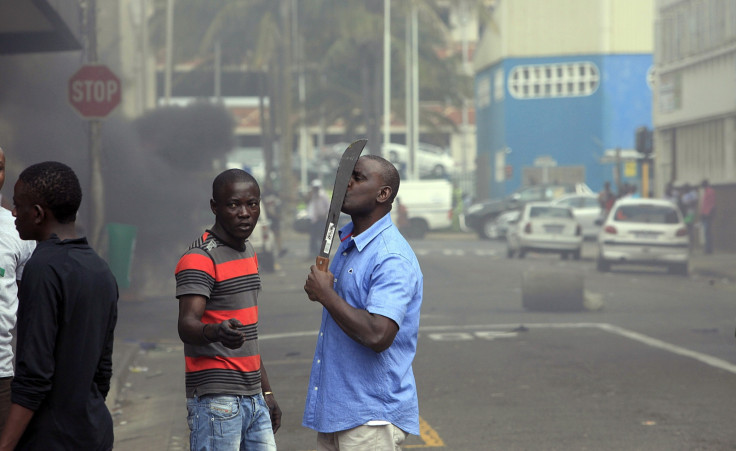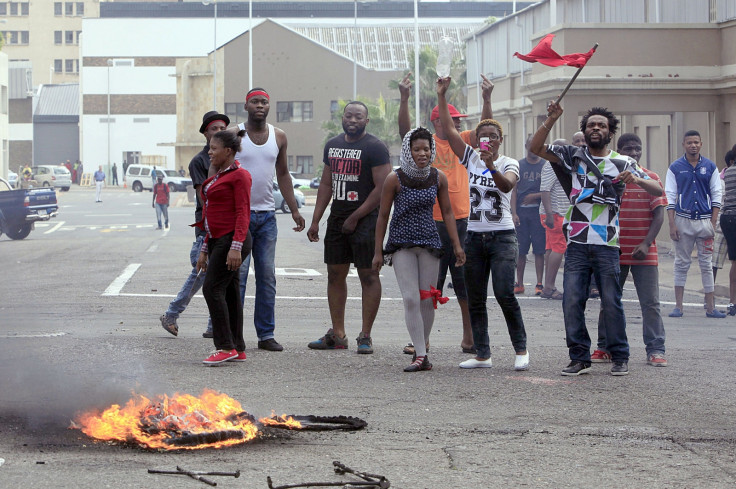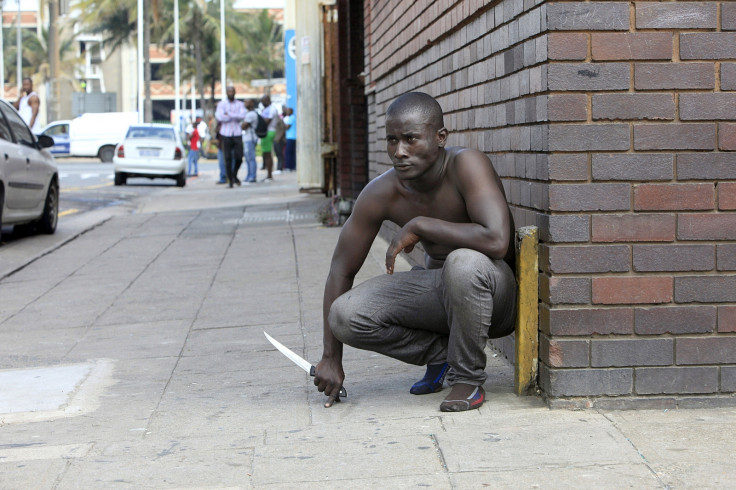South Africa xenophobia: Deadly anti-foreigner riots in Durban explained

At least five people have been killed in a surge of xenophobic attacks in South Africa on 14 April, where locals have been targeting foreigners - mostly African immigrants from Nigeria, Somali, Malawi, Zimbabwe and Ethiopia - in and around the city of Durban, in the KwaZulu-Natal province.
According to local media, at least 1,500 foreigners have fled their homes and are now living in makeshift camps.
President Jacob Zuma condemned the violence while police have been deployed to halt the xenophobic attacks. It is believed that more than 40 people linked to the violence have been arrested. Police used stun grenades and tear gas to disperse protesters on 14 April.
While the anti-foreigner violence continues amid fears that the protest is expanding to Johannesburg, IBTimes UK looks at the most important things to know about South Africa's worst outbreak of xenophobic violence in recent years.
Foreigners 'need to pack their bags and leave ' - Why did the protest start?
Violence against foreigners is common in South Africa. At least four people were killed in Soweto, Johannesburg, in January 2015, following the alleged murder of a South African teenager by a Somalian shopkeeper. The alleged killing sparked violence and three other people were killed while dozens of foreign-owned shops were looted.
This time, it is believed that violence erupted following alleged comments by Zulu King Goodwill Zwelithini, who said that foreigners need to "pack their bags and leave". Following the comment - which Zwelithini denied he had made - several South Africans took to the streets of Durban and attacked and looted foreign-owned shops and properties. The protesters accused foreign nationals of living in South Africa illegally and of stealing jobs and opportunities.

Foreigners not willing 'to be prey'
South Africa's IOL News reported that foreign nationals were ready to retaliate against the attackers and declared they were not willing to "be prey for South Africans".
Nigerians in the Durban Point area built barricades with burning tyres and debris. When interviewed by IOL, they said: "We have nowhere else to go. We can't go back; the sea is behind us, so we have to fight back."
An angry group of foreigners said: "It's easy; government can just open the border gates and let us go if they don't want us. But they must know that no plane must leave South Africa to come to our countries."
South African and foreign government response
Religious and political leaders are planning a "Not in Our Name" peace march to commemorate the five victims, which unconfirmed reports say are three Ethiopians and two South Africans, one of whom was a 14-year-old boy. The march will take place on 16 April.
Malawi announced it plans to repatriate hundreds of its citizens, while members of the Ethiopian community in South Africa said they will hold a vigil for the Ethiopian victims, two of whom are believed to have been killed when their shop was petrol-bombed.
Ambassadors from Ethiopia, Nigeria, Zimbabwe, Somalia, Mozambique, and Malawi met with Home Affairs Minister Malusi Gigaba and KwaZulu-Natal Premier Senzo Mchunu to discuss actions to protect civilians.

South Africa's xenophobia - Not a new phenomenon
According to some, the xenophobic attacks are part of unresolved issues and a past that South Africans are struggling to forget.
The Nelson Mandela and Ahmed Kathrada Foundations released a joint statement in which they said the latest outburst of violence is the "manifestation of a phenomenon which has been troubling our [South African] democracy for a long time. For too long South Africans in leadership positions have either ignored the crisis or stoked the fires of hatred.
"We call on all South Africans to take responsibility for embracing the hospitality that defines our democratic order and to work together to find solutions to a problem which is destroying lives and bringing South Africa shame internationally."
Similar unrest occurred in 2008
In 2008, at least 60 people were killed in xenophobic violence in South Africa, prompting some 6,000 people to flee.
The protest originated in the township of Alexandra, but expanded to neighbouring areas. At the time of the unrest, the Guardian reported that some 50 people were taken to hospital with gunshot and stab wounds after protesters attacked dozens of shops and businesses owned by Zimbabweans in Cleveland, in the south of Johannesburg.
When interviewed by the BBC, some Zimbabweans said they were willing to return home, despite violence in their country.
At least 1,140 people were arrested in connection with the violence, while displaced people were moved into temporary refugee camps with the government vowing not to force reintegration and not to deport immigrants found to be living in South Africa illegally.
Some politicians alleged that the xenophobic violence was politically motivated. The Mali government repatriated some of its citizens while the international community condemned the violence.
The office of the United Nations High Commissioner for Refugees urged the South African government to halt deportation of Zimbabweans and grant asylum to the immigrants.
© Copyright IBTimes 2025. All rights reserved.




















